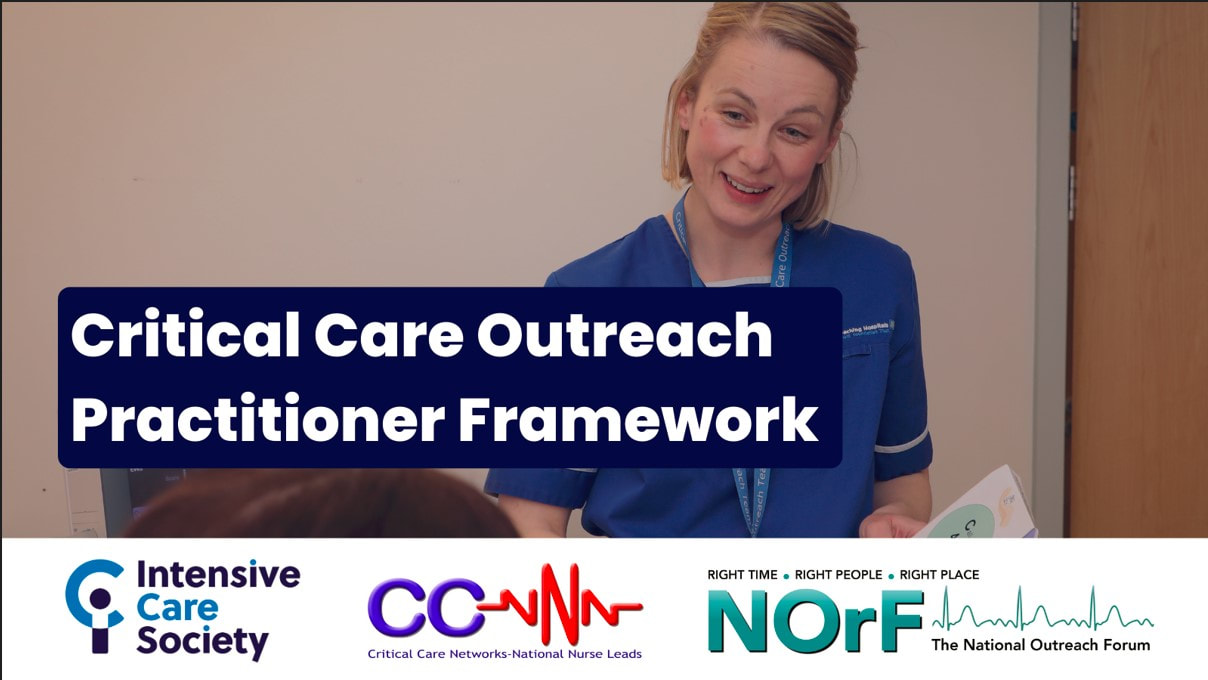Launch of the Critical Care Outreach Practitioner Framework
We are delighted to announce the publication of the Critical Care Outreach Practitioner (CCOP) Framework. This eagerly awaited competency-based document will facilitate the structured development and career progression of post registration Health Care Professionals (HCPs) working in critical care outreach or equivalent service, and introduce a system of credentialing recognised by CCOPs, hospital managers, clinical and educational commissioners, HEIs, national regulators and the public.
The intention is that the ‘Enhanced Practice Level’ serves as the nationally recognised minimum standard and credential of competence, skills and behaviours required of HCPs providing Critical Care Outreach services, ensuring that CCOPs have a level of competence commensurate with the level of patient care provided. CCO specific competencies at ‘Advanced and Consultant Practice Levels’ have been included as separate appendices for HCPs studying at these levels and should be achieved if maintaining a clinical practice role in critical care outreach.
This first iteration of the CCOP Framework is a result of a collaboration between the National Outreach Forum (NOrF), Intensive Care Society (ICS) and Critical Care Networks National Nurse Leads Forum (CC3N) and the steadfast commitment and clinical expertise of the Working Group.
Working Group Chair, Lesley Durham, said “I had the honour and privilege to lead the framework’s development. The enthusiasm and commitment of the Working Group, Sub-Group leads, professional organisations and stakeholders has been inspiring, particularly against a backdrop of COVID-19 and many NHS service challenges. I am indeed most grateful for their tireless hard work and thank each and every individual for their invaluable contribution – Thank you!”
This is the beginning and not the end. The next step is to embed the CCOP Framework into education and practice to ensure patients receive timely and compassionate bedside care wherever and whenever it is required, delivered by competent and skilled Critical Care Outreach Practitioners.
Intensive Care Society Chief Executive, Sandy Mather, said “This landmark document helps outline a clear development roadmap for critical care outreach practitioners across the country. The Society is proud to be part of the voice that champions these professionals and the invaluable support they provide.”
CC3N former Chair, Claire Horsfield and current Chair Karen Wilson said “CC3N are delighted to have been involved in the development of this greatly anticipated, ground-breaking document which will support the development of new and existing Critical Care Outreach Practitioners. The Framework will be an invaluable resource to improve the care for deteriorating patients”.
NOrF Chair, Natalie Pattison and former Chair Isabel Gonzalez, said “Critical care outreach practitioners provide a range of supportive and emergency care for people at risk of deterioration, and are a recognised lynchpin to maintain safety of patients. This framework will support the development of specialist skills and knowledge, and have these formally recognised within enhanced, advanced and consultant levels of practice.”
We are delighted to announce the publication of the Critical Care Outreach Practitioner (CCOP) Framework. This eagerly awaited competency-based document will facilitate the structured development and career progression of post registration Health Care Professionals (HCPs) working in critical care outreach or equivalent service, and introduce a system of credentialing recognised by CCOPs, hospital managers, clinical and educational commissioners, HEIs, national regulators and the public.
The intention is that the ‘Enhanced Practice Level’ serves as the nationally recognised minimum standard and credential of competence, skills and behaviours required of HCPs providing Critical Care Outreach services, ensuring that CCOPs have a level of competence commensurate with the level of patient care provided. CCO specific competencies at ‘Advanced and Consultant Practice Levels’ have been included as separate appendices for HCPs studying at these levels and should be achieved if maintaining a clinical practice role in critical care outreach.
This first iteration of the CCOP Framework is a result of a collaboration between the National Outreach Forum (NOrF), Intensive Care Society (ICS) and Critical Care Networks National Nurse Leads Forum (CC3N) and the steadfast commitment and clinical expertise of the Working Group.
Working Group Chair, Lesley Durham, said “I had the honour and privilege to lead the framework’s development. The enthusiasm and commitment of the Working Group, Sub-Group leads, professional organisations and stakeholders has been inspiring, particularly against a backdrop of COVID-19 and many NHS service challenges. I am indeed most grateful for their tireless hard work and thank each and every individual for their invaluable contribution – Thank you!”
This is the beginning and not the end. The next step is to embed the CCOP Framework into education and practice to ensure patients receive timely and compassionate bedside care wherever and whenever it is required, delivered by competent and skilled Critical Care Outreach Practitioners.
Intensive Care Society Chief Executive, Sandy Mather, said “This landmark document helps outline a clear development roadmap for critical care outreach practitioners across the country. The Society is proud to be part of the voice that champions these professionals and the invaluable support they provide.”
CC3N former Chair, Claire Horsfield and current Chair Karen Wilson said “CC3N are delighted to have been involved in the development of this greatly anticipated, ground-breaking document which will support the development of new and existing Critical Care Outreach Practitioners. The Framework will be an invaluable resource to improve the care for deteriorating patients”.
NOrF Chair, Natalie Pattison and former Chair Isabel Gonzalez, said “Critical care outreach practitioners provide a range of supportive and emergency care for people at risk of deterioration, and are a recognised lynchpin to maintain safety of patients. This framework will support the development of specialist skills and knowledge, and have these formally recognised within enhanced, advanced and consultant levels of practice.”
